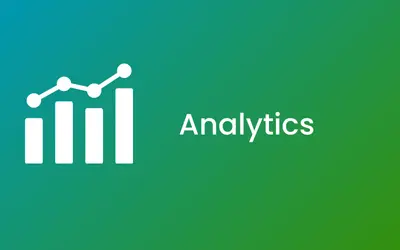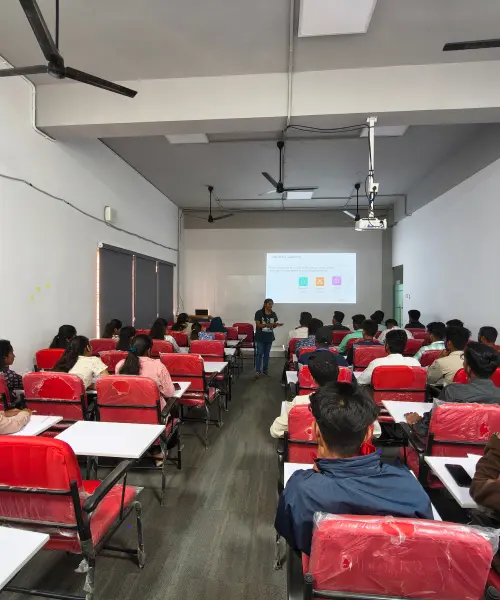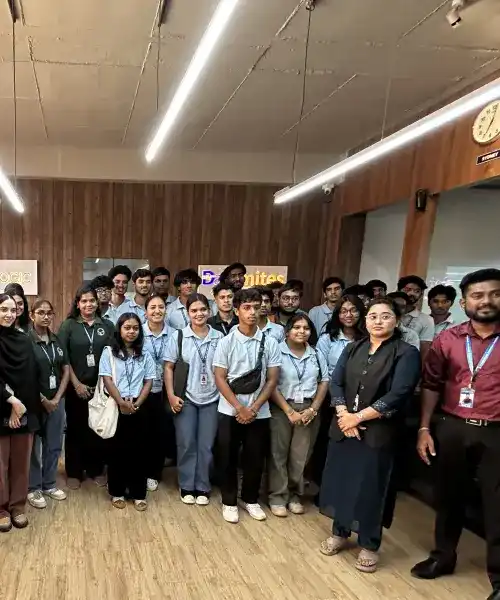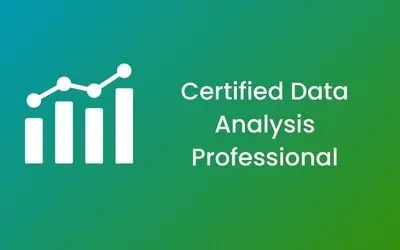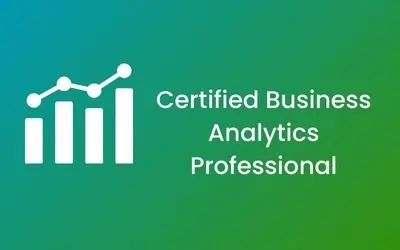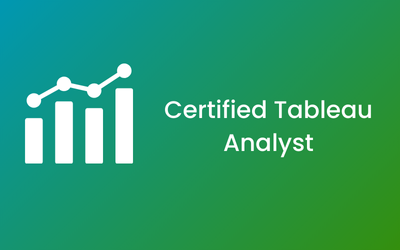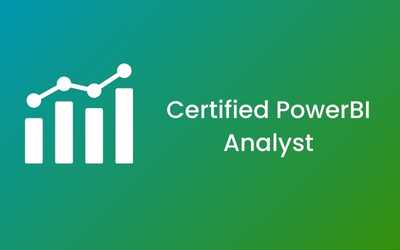- Skyrocketing Career Opportunities: Hyderabad’s booming tech ecosystem creates massive demand for skilled data analysts and business analysts, ensuring strong career growth and job security.
- High-Paying Roles Await: Completing Skillfloor’s program opens doors to lucrative positions in data analytics, business intelligence, and AI-driven roles that companies actively seek.
- Industry-Driven Curriculum: The course is designed with insights from industry experts, covering the latest tools, techniques, and analytics trends to make you job-ready.
- Learn from the Experts: Get hands-on guidance from seasoned data professionals who simplify complex concepts and share actionable, real-world knowledge.
- Learn Emerging Analytics Trends: Stay ahead of the curve by learning AI, machine learning, and predictive analytics, preparing you for the future of data-driven decision-making
- Networking & Industry Exposure: Connect with professionals, mentors, and peers in Hyderabad’s thriving analytics ecosystem, opening doors to collaborations, internships, and job opportunities.
- Practical, Hands-On Learning Experience: Skillfloor gives you real exposure through live projects, case studies, and industry datasets, helping you build a strong portfolio that boosts your hiring potential.
- Flexible Learning Options: Whether you're a student or a working professional, Skillfloor’s flexible schedules and blended learning modes allow you to upskill without disturbing your daily routine.
- Placement Support & Career Guidance: Benefit from resume-building sessions, mock interviews, and personalized mentorship, ensuring you're fully prepared for analytics roles in Hyderabad’s top companies.
- Industry-Recognised Certification: Earn a valued analytics certification that strengthens your credibility and makes you stand out in Hyderabad’s competitive data and BI job market.
Rise of AI‑Powered Analytics Careers
India’s analytics landscape is transforming at lightning speed. AI job postings in India jumped by 42% in just two years, reaching over 2.53 lakh AI-related roles. At the same time, more than 11.7% of job listings in India now explicitly mention AI, and nearly 39% of data & analytics roles refer to artificial intelligence in their descriptions. This surge is not about AI replacing people; it’s about collaboration. AI is automating repetitive tasks like data cleaning and report generation, while analysts are increasingly driving high-impact work: building predictive models, interpreting machine-generated insights, and guiding strategic decisions.
As a result, the roles of data analysts, business analysts, ML engineers, and data scientists are shifting. These are not just technical roles: they demand human expertise to design, fine-tune, and communicate AI-driven outcomes, and that is exactly where Skillfloor’s Analytics and Data Science programs come into play.
Salary Trends for Analytics Professionals in India
The demand for data professionals in India has skyrocketed, and so have salaries. Entry-level data analysts equipped with skills in Excel, SQL, Power BI, and Python can expect packages ranging from ₹3.5–5 lakh per year, depending on the city and company size. Mid-level professionals with 3–5 years of experience, specializing in predictive analytics, machine learning, and business intelligence dashboards, see salaries jump to ₹6–10 lakh annually. Senior roles such as data scientists, AI developers, and analytics managers command premium compensation, often ₹20–30 lakh per year, especially in major tech hubs like Bangalore, Hyderabad, and Ahmedabad.
Certifications from trusted platforms like Skillfloor boost career prospects significantly. Data analysis professionals holding Skillfloor credentials are in high demand, as employers recognize their hands-on experience, real-world project exposure, and industry-relevant skills. Moreover, expertise in cloud analytics, Python, R, Tableau, and AI-driven automation tools further enhances earning potential and opens doors to top-tier opportunities. With India’s analytics and AI industry growing at a CAGR of nearly 15–20%, the salary potential and career growth in analytics remain robust, making it one of the most lucrative paths for aspiring data professionals.
How Analytics is Driving Digital Transformation
Analytics and AI are reshaping businesses by enabling data-driven decision making, improving accuracy by 20–30%, and optimizing processes with machine learning and BI tools to cut costs by 15–25%. Across industries like finance, healthcare, retail, manufacturing, and IT, predictive analytics enhances customer experience by 20–35%, supports strategic planning, and fuels demand for skilled analytics professionals who can turn data into actionable insights.
Key Highlights:
-
Data-Driven Decision Making: Boost decision accuracy by 20–30% with analytics and AI.
-
Process Optimization: Automate workflows and reduce operational costs by 15–25%.
-
Enhanced Customer Experience: Increase engagement and retention by 20–35% using predictive analytics.
-
Strategic Planning & Innovation: Build predictive models and dashboards for data-backed growth.
-
Cross-Industry Applications: Analytics is widely applied in finance, healthcare, retail, manufacturing, and IT.
-
High Talent Demand: Skilled analytics professionals are in high demand in the digital transformation era.
Industry-Specific Applications of Data Analytics
As industries increasingly realize the transformative potential of data analytics, the demand for skilled professionals is surging, making it a critical area for career growth and analytics innovation.
-
Healthcare: According to a McKinsey report, leveraging big data analytics could save the U.S. healthcare system between $300 billion and $450 billion annually by improving operational efficiency, patient outcomes, and reducing waste.
-
Finance: ResearchGate highlights that big data analytics enhances financial forecasting, fraud detection, and resource allocation. Firms with more data analysts often demonstrate stronger investment performance, emphasizing the value of analytics expertise.
-
Manufacturing: Predictive analytics can reduce machine downtime by up to 45%, resulting in significant cost savings and higher productivity. Digital twin technology supports real-time monitoring, predictive maintenance, and process optimization, improving both efficiency and product quality.
Outlook: Precedence Research reports that the Asia-Pacific data analytics market is projected to grow at a CAGR of 23.5% from 2024 to 2034, underlining the increasing reliance on analytics for strategic planning and competitive advantage.
Data Analytics Course Fee Structure in Hyderabad
-
Basic/Short-Term Courses (1–3 Months): ₹15,000–₹40,000
-
Advanced Certificate Courses (3–6 Months): ₹30,000–₹180,000
-
Post-Graduate/Diploma Programs (6–12 Months): ₹120,000–₹600,000
-
Executive/Master’s Programs (12–18 Months): ₹400,000–₹900,000
Skillfloor Course Fee Structure:
Skillfloor’s Data Analytics course fee in Hyderabad is competitively priced at ₹14,900, offering certified professional programs with hands-on projects, live training, internship opportunities, and dedicated career support—making it a cost-effective choice for students and working professionals.
-
Certified Data Analysis Professional: ₹14,900 (discounted from ₹60,000) — 2 months + 1-month internship.
-
Certified Business Analytics Professional: ₹14,900 (discounted from ₹60,000) — 2 months + 1-month internship.
-
Certified Power BI Analyst: ₹14,900 (discounted from ₹60,000) — 2 months + 1-month internship.
- Certified Tableau Analyst: ₹14,900 (discounted from ₹60,000) — 2 months + 1-month internship.
Begin Your Data Analytics Journey with Skillfloor
Data analytics is more than just a career; it empowers businesses and drives smart decision-making across industries. At Skillfloor, we provide top-quality resources, expert training, and continuous support to help you thrive in this dynamic field. As a leading institute, we prepare aspiring professionals with the essential skills and knowledge to succeed in data analytics.
Our Data Analytics training programs equip you with the latest tools, techniques, and industry best practices, ensuring you remain competitive and future-ready. Skillfloor offers specialized courses in Data Science, Data Analytics, Artificial Intelligence, Machine Learning, Data Engineering, and Python Programming for all skill levels.. If you're exploring opportunities beyond Hyderabad, you can also check our Analytics Course in Ahmedabad to advance your career in another growing tech hub. If you're looking to expand your skill set beyond analytics, Skillfloor also offers a comprehensive Digital Marketing Course in Hyderabad, where you can learn SEO, social media marketing, Google Ads, content strategy, and email marketing with hands-on projects and placement support.

